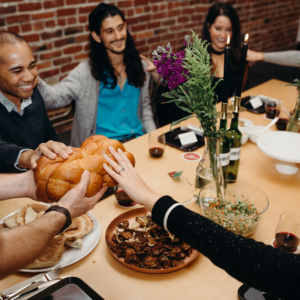Introduction
Published in 2017, this was OneTable’s first national study to understand how an organization designed to scale is having an impact on an individual’s personal life, Jewish practice, social connections, and wellbeing. This data represents the first 55,000 young adults who participated in our first cities: Atlanta, the Bay Area, Chicago, Colorado, Washington, D.C., Los Angeles, New York, and Pittsburgh.
Survey data make clear where OneTable is having success in realizing its outcomes. Participants are exceptionally positive about their engagement with OneTable; they are particularly willing to recommend OneTable to others. They also experience OneTable dinners to be different from other Shabbat dinner experiences. A majority of users cite Shabbat ritual and the presence of other Jews as making dinners feel Jewish.
In terms of outcomes, a number of data points align in encouraging ways. Guests who are not involved with other Jewish organizations or communities and who attend four or more dinners show higher outcomes than their peers who attend fewer dinners. It is also evident that greater exposure to core aspects of the OneTable experience — the dinners themselves, Nosh:pitality, and coaching — are all associated with higher outcomes.
OneTable is helping young adults feel comfortable at Shabbat dinners.
Highlights
It’s nice to see that there’s an organization that just cares about your experience being meaningful to you. So it could be for people who aren’t connected to their Judaism at all but this would bring them some kind of meaning.
– OneTable host

Research Findings
Getting involved and finding a place in community changes OneTable participants’ lives. After hosting and attending Shabbat dinners, OneTable participants feel more comfortable at Shabbat dinners, and some have even started seeking out Shabbat dinner opportunities outside of OneTable. It changes the way they spend their weekend, with Jewish practice, ritual and time.
Because of OneTable, participants change the way they relate to Shabbat…
- 48% feel more comfortable at all Shabbat dinners
- 59% meet new people at OneTable dinners
- 65% try to pause and relax at the end of the week
- 83% of hosts incorporate Jewish ritual into their Shabbat dinner
- 38% of first-time hosts feel confident incorporating something Jewish
- 57% of repeat hosts feel extremely confident
What’s great is it’s not just a religious thing. It’s also a community thing. It’s not just about teaching, but it’s about togetherness. Especially in the culture we’re all living in these days, I find it so fulfilling to have that in your life.
— OneTable host

Background + Methodology
In order to understand our impact on OneTable participants, OneTable engages in ongoing, rigorous internal monitoring and evaluation, in addition to having contracted external evaluation services from Rosov Consulting and market research consultant Jamie Betesh. At the date of publication, OneTable had commissioned Rosov Consulting to produce two studies involving quantitative (surveys) as well as qualitative (focus groups and interviews) methods.
The outcomes survey was fielded to 23,275 individuals whose contact information is collected in OneTable’s CRM (Salesforce). This included all guests and/or hosts, as well as individuals who had expressed an interest in guesting or hosting but had not done so yet. The average rate for completed or partial responses was 12%, in line with the rates reported in other studies of millennial program participants; 2,732 responses were received in all, of which 70% were from guests, 25% from hosts, and 5% from host applicants.
In many respects, the responses of hosts were not consistent with those who have only been guests, so post-sample weighting was used to correct for this over-sampling of hosts over guests. Our sample also had significantly more dinner guests who attended multiple dinners (repeaters) compared to the number of repeaters in the database. We corrected for this imbalance as well, using post-sample weighing.

